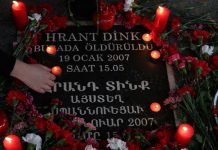Turkish authorities must cease all actions aimed at blocking or criminalizing independent reporting and take steps to restore judicial independence and to ensure the country’s legal framework regarding free expression complies with international standards, the Council of Europe’s (CoE) annual report, “Platform to Promote the Protection of Journalism and Safety of Journalists,” said.
According to the report, Turkish journalists face an ongoing campaign of judicial harassment, driven by the authorities’ intention to thwart critical reporting, which is exacerbated by the context of a lack of prosecutorial and judicial independence and impartiality. Non-implementation of the decisions of the European Court of Human Rights (ECtHR) and political attacks on the independence of the Constitutional Court are cited as factors further compromising the rule of law in the country.
The report says a high number of verbal attacks against journalists were made by Turkish officials during 2020. It cites Interior Minister Süleyman Soylu’s use of Twitter to denigrate journalist Müyesser Yıldız, a columnist for Oda TV, accusing her of having “terrorist” sympathies.
The report also mentions the difficulties that Turkish journalists and media outlets experience when reporting on the effects of the COVID-19 pandemic, including fines and threats of arrest. It gives the examples of the broadcast ban against Fox TV over anchor Fatih Portakal’s critical comments while reporting on the government’s COVID-19 policies and the arrest of former Halk TV executive and journalist Hakan Aygün on April 3 for “incitement to hatred” after he criticized Turkish President Recep Tayyip Erdoğan’s campaign to collect public donations in the fight against the pandemic.
The platform is composed of 14 international NGOs and journalist associations including Reporters Without Borders, the International Federation of Journalists and Article 19. Its annual report lists 201 serious cases of threats to media freedom in the 47 Council of Europe member states in 2020, a 40 percent increase compared to 2019. A record number of alerts concerned physical attacks (52 cases) and harassment or intimidation (70 cases).
The report analyzes serious threats to press freedom including those posed by the impunity of perpetrators of crimes against journalists, state-led capture of independent media, judicial harassment, political pressure on public service media and surveillance of journalists.
According to the report, most of Turkey’s mainstream media is under the control of government allies, and the country’s media regulators have been instrumentalized to pressure what remains of independent media in the country. Turkey’s broadcast regulator RTÜK stepped up its threats to independent broadcasters, and numerous stations faced fines and the threat of having their license suspended over critical content.
Similarly, the Turkish government exploits state funding for the media to punish critical media and reward friendly outlets, the report says, citing state advertising bans that independent newspapers such as Evrensel and BirGün faced in 2020.
The report mentions content moderation measures as a way of outsourcing censorship to tech platforms. These measures now have a wide-reaching impact on the online space for journalism, and this is especially important for countries like Turkey and the Russian Federation, where “online platforms provide an opening for free expression amid a state-led takeover of the mainstream press,” the report says.
In its annual report the platform partners welcome Turkey’s efforts to bring those responsible for the murder of Saudi journalist Jamal Khashoggi to justice but call on Turkish authorities to make similar efforts to ensure that those behind the murder of all other journalists killed on Turkish soil are brought to justice, including those behind the killings of Rohat Aktaş, Hrant Dink, Naji Jerf and Saaed Karimian.
According to the report the Turkish government, along with Azerbaijan and the Russian Federation, declined to reply to alerts and engage with the work of the platform, failing to fulfill their obligations under the European Convention on Human Rights.















